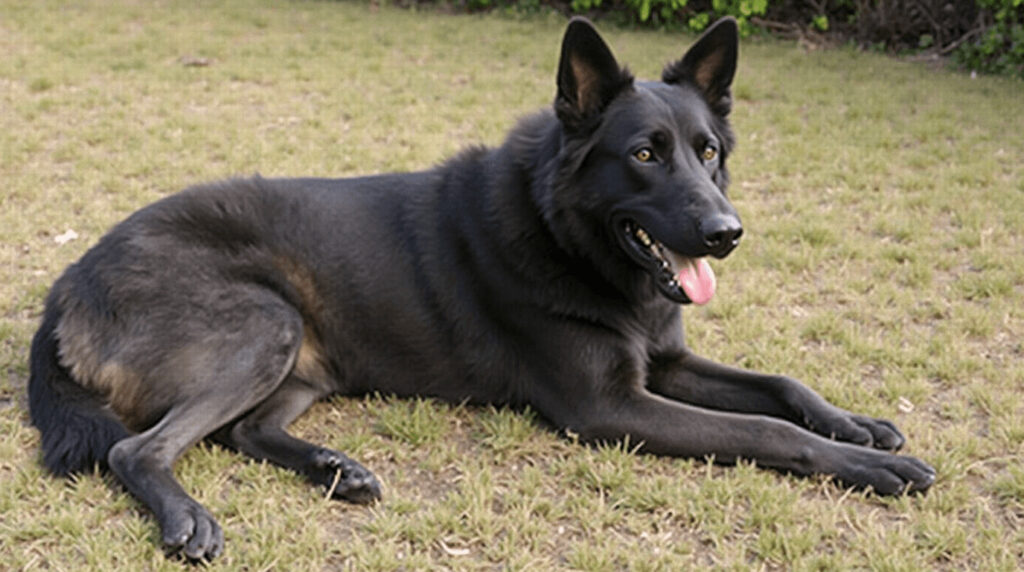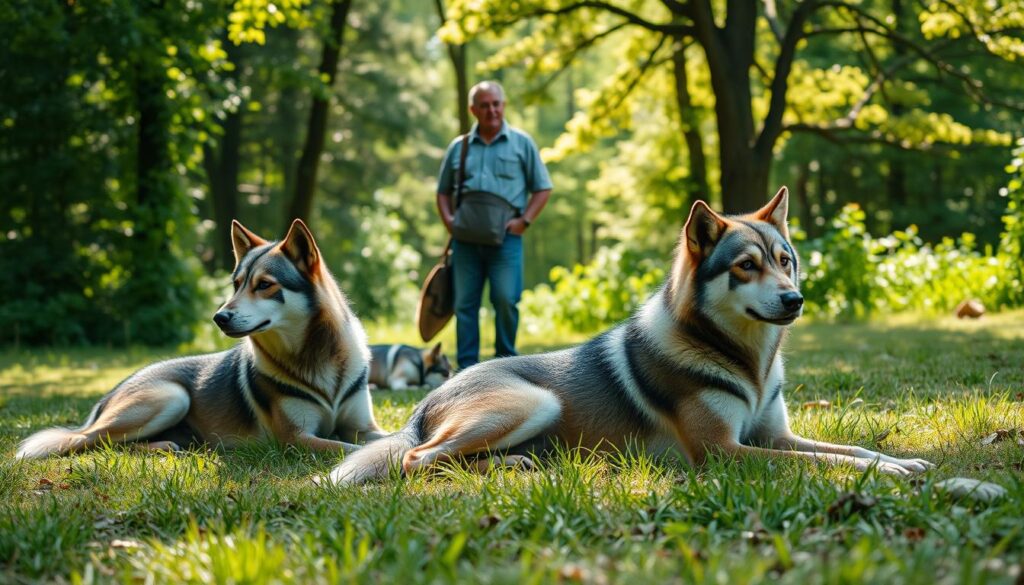Thinking about getting a wolf dog for sale? These pets are a mix of wild and domestic traits. Bringing one home can be exciting, but it’s crucial to know the challenges and duties of owning a wolf dog.

Getting a wolf dog means a big commitment of time, money, and effort. You’ll need to create a good home, take care of their needs, and give them lots of attention. With the right steps, you can build a strong and loving bond with your wolf dog.
Key Takeaways
- Research the laws and regulations regarding wolf dog ownership in your area
- Understand the specific needs of wolf hybrid puppies, including diet and exercise
- Prepare your home and family for the unique challenges of owning a wolf dog
- Find a reputable breeder or rescue organization to find your wolf dog for sale
- Be prepared for a long-term commitment to caring for your wolf dog
Understanding Wolf Dogs: A Unique Blend of Wild and Domestic
Thinking about getting a wolf dog? It’s key to know their background and what makes them special. Wolf dogs mix wild and domestic traits, making them interesting. When you look to buy wolf dog online, choose timberwolf dog breeders who care about their animals’ health.
The wolf content percentage is important. It shows how much wolf DNA the dog has. You’ll find different wolf dog breeds, like:
- Arctic Wolf Dog
- Timber Wolf Dog
- Eastern Wolf Dog
When searching for timberwolf dog breeders, look for those who share wolf content info. This helps you choose the right breed. Also, ask about the buying a wolf dog online process and what to expect from the breeder.

Understanding wolf dogs and finding a good breeder can bring a loving pet home. Always research and put the animal’s welfare first for a happy, healthy bond.
The Reality of Owning a Wolf Dog Hybrid
Owning a wolf dog hybrid is unique and rewarding. But, it comes with challenges and responsibilities. You must find a reputable breeder for a healthy, well-socialized puppy. Look online or ask local breed clubs for recommendations on where to find wolf dog breeders.
Adopting wolf dog puppies for adoption is a detailed process. It’s important to find a puppy that fits your lifestyle and home. Research the breed, learn about their needs, and prepare your home and family for the new pet.
Here are some key things to consider when adopting a wolf dog hybrid:
- Space: Wolf dog hybrids need lots of space to run and exercise. You’ll need a large yard or a secure, fenced area.
- Training: They are highly intelligent and need regular training and socialization. This ensures they are well-behaved and obedient.
- Care: Wolf dog hybrids have specific dietary and health needs. You’ll need to research and understand how to provide the best care for your pet.

By researching and understanding the reality of owning a wolf dog hybrid, you can give your pet a happy and healthy home. Always prioritize your pet’s needs and seek professional advice if unsure about their care.
| Breeder | Location | Phone Number |
|---|---|---|
| Wolf Dog Breeders | California | 555-555-5555 |
| Hybrid Haven | Florida | 555-123-4567 |
Legal Considerations Before Getting Your Wolf Dog
Before getting a wolf dog, you must think about the legal side. The price of a wolf dog changes based on where you live, the breed, and its age. If you’re looking at a wolf dog rescue, you need to know the laws in your area.
Getting a wolf dog is a big deal. The cost can be from a few thousand to over $10,000. You also have to think about the ongoing expenses like food, vet bills, and supplies.
State-Specific Regulations
Every state has its own rules for owning wolf dogs. Some places, like Alaska and Michigan, have special laws. Others, like California and New York, have stricter rules. You should check your state’s laws before getting a wolf dog.
Required Permits and Licenses
You might need permits and licenses to own a wolf dog. These could include permits from the USDA and local animal control. The cost varies, but they’re needed to protect the animal and people.
Insurance Requirements
Insurance is key when you have a wolf dog. Many home insurance policies don’t cover wolf dogs. You might need a special policy. The cost depends on the coverage, but it’s important to be protected.
Finding a Wolf Dog for Sale: Your Complete Guide
Looking for a wolf dog for sale? It’s key to find breeders who care about their animals’ health and happiness. A good breeder will share lots of info about the wolf dog’s background, health, and personality.
Make sure you’re dealing with a reliable breeder. Watch out for red flags like many breeds on one website or unclear information about the wolf dog’s past. Also, ask questions like:
- What is the wolf dog’s ancestry and bloodline?
- Can I visit the breeder’s facility and meet the parents of the wolf dog?
- What health guarantees do you offer, and what is your policy on returns or refunds?
By researching and choosing a reputable breeder, you boost your chances of getting a healthy and friendly wolf dog. Always keep the animal’s well-being in mind during your search.
| Breeder Characteristics | Reputable Breeder | Unreputable Breeder |
|---|---|---|
| Transparency about wolf dog’s history | Yes | No |
| Health clearances and guarantees | Yes | No |
| Facility visitation allowed | Yes | No |
Wolf Dog Price Ranges and Investment Considerations
Thinking about getting a wolf dog? It’s key to know the costs and what you’ll need to invest. The price of wolf hybrid puppies changes based on wolf content, bloodlines, and the breeder’s reputation. Timberwolf dog breeders who are known for quality might charge more. This is because they put a lot of effort and care into breeding these special animals.
Here are some things to think about when you decide to get a wolf dog:
- Purchase price: The initial cost of buying a wolf dog, which can range from $1,000 to $5,000 or more, depending on the breed and bloodlines.
- Food and supplies: The cost of feeding and caring for a wolf dog, which can be higher than for a domestic dog due to their unique dietary needs.
- Veterinary care: Regular veterinary check-ups and potential health issues that may arise, which can be more expensive for wolf dogs due to their exotic nature.
It’s important to research and understand the costs of owning a wolf dog. This includes the price of wolf hybrid puppies and the care needed for a timberwolf dog. By doing your homework, you can make a smart choice. This ensures you’re ready to give your new pet the care and attention it needs.
| Factor | Cost |
|---|---|
| Purchase price | $1,000 – $5,000 |
| Food and supplies (annual) | $1,500 – $3,000 |
| Veterinary care (annual) | $500 – $1,000 |
Essential Requirements for Wolf Dog Housing
When you decide to buy wolf dog online, think about their housing needs. A good home is key for their happiness and safety. You’ll need to focus on the right enclosure, security, and ways to keep them engaged.
Before looking for where to find wolf dog breeders, know what you need. Your home must be safe, secure, and big enough for your wolf dog to play.
Enclosure Specifications
- Minimum size of 100 square feet
- Secure fencing at least 6 feet high
- Adequate ventilation and shading
Security Measures
Wolf dogs are strong and agile. So, you must add extra security to keep them safe and inside.
Environmental Enrichment
Keeping your wolf dog’s mind and body active is important. Give them toys, treats, and activities that match their natural behavior.
By meeting these needs, you can make a great home for your wolf dog. Whether you buy wolf dog online or find a breeder, always put your pet’s happiness first. Research well and choose a reputable breeder.
Training and Socialization Challenges
Thinking about getting a wolf dog means facing training and socialization hurdles. Wolf dog puppies need early socialization to grow into well-adjusted adults. The price of a wolf dog varies, but remember to include training and socialization costs.
Some key considerations for training and socializing your wolf dog include:
- Early socialization to people, other animals, and new environments
- Positive reinforcement training to encourage good behavior
- Consistency and patience, as wolf dogs can be strong-willed and independent
Understanding a wolf dog’s needs is crucial before bringing one home. With proper training, socialization, and care, they can be loving and loyal companions.
| Age | Training Needs | Socialization Needs |
|---|---|---|
| Puppy (8-12 weeks) | Basic obedience training | Socialization to people, other animals, and new environments |
| Adolescent (4-6 months) | Advanced obedience training | Continued socialization and introduction to new experiences |
| Adult | Refining training and addressing any behavioral issues | Continued socialization and mental stimulation |
Diet and Nutrition Requirements
As a wolf dog owner, it’s key to give your pet a balanced diet. You might want to try a raw diet with raw meat, fruits, and veggies. This diet is good but needs careful planning to ensure your wolf dog gets all nutrients. If you’re thinking about adopting a wolf dog, talk to a vet or a good breeder to find the best diet.
Or, you could choose commercial dog food available in stores. When picking a commercial food, look for quality ingredients. Always check with your vet to find the best food for your wolf dog. Feeding your wolf dog 2-3 times a day is a good rule, based on their age, size, and how active they are.
Remember, good wolf dog breeders can offer great advice on diet and nutrition. They can help pick the best diet for your wolf dog, considering their breed, age, and health. Working with a reputable breeder or rescue ensures your wolf dog gets the nutrition they need to be healthy.
Health Care and Veterinary Needs
Bringing a wolf dog into your family means understanding their health care needs. These animals require regular check-ups and vaccinations to stay healthy. It’s your job as an owner to make sure they get the care they need.
Finding a vet who knows wolf dogs is key. Ask other owners or breeders for recommendations. The cost of care can vary, but expect to spend $500 to $1000 a year.
Wolf dogs can face issues like hip dysplasia, eye problems, and parasites. Regular vet visits can catch these early. Vaccinations and parasite control are also crucial for their health. Make sure they’re up to date on rabies, distemper, and parvovirus shots.
Investing in pet insurance is a smart move. It can help with unexpected vet bills. By focusing on your wolf dog’s health, you ensure they live a long, happy life.
Understanding Wolf Dog Behavior Patterns
Thinking about getting a wolf dog from a reputable breeder? It’s key to know their behavior. Wolf dogs mix wild and domestic traits. They have a pack mentality, mark territory, and form strong social bonds.
Adding a wolf dog to your family is a big step. They love to interact and need lots of attention. They also need exercise, training, and mental games to stay happy and avoid bad habits.
Pack Mentality
Wolf dogs are pack animals with a clear hierarchy. They naturally follow a leader and establish a pecking order. As their owner, you must be the pack leader, setting clear rules and boundaries.
Territory Marking
Wolf dogs mark their territory with scent and visual signs. They might urinate, defecate, or scratch to claim their space. You need to give them a safe and stable home that meets their territorial needs.
Social Bonds
Wolf dogs bond strongly with their pack. They are very affectionate and loyal, needing lots of attention. When you get a wolf dog, think about how they’ll bond with your family and other pets.
Knowing how wolf dogs behave helps you give them a great life. Look for reputable breeders and ask lots of questions before buying. With the right care, your wolf dog will be a loving family member.
| Behavior Pattern | Description |
|---|---|
| Pack Mentality | Wolf dogs are pack animals that live in a hierarchical structure. |
| Territory Marking | Wolf dogs are territorial animals that mark their territory using scent and visual cues. |
| Social Bonds | Wolf dogs form strong social bonds with their pack members. |
Exercise and Mental Stimulation Requirements
As a wolf dog owner, it’s crucial to keep your pet active and mentally sharp. This prevents boredom and stress. Create a fun space for them to run and play. If you’re searching for wolf dog puppies for adoption, reach out to trusted breeders. They can tell you about the exercise needs of their puppies.
To find a good breeder, look for where to find wolf dog breeders in your area. Choose those who care about their dogs’ health and happiness. A responsible breeder will guide you on keeping your wolf dog happy and stimulated.
Ways to keep your wolf dog’s mind active include puzzle toys and scavenger hunts. Playtime activities like fetch and agility training are also great. Regular exercise and mental challenges ensure your wolf dog lives a joyful and healthy life.
- Provide plenty of space to run and play
- Create a stimulating environment with puzzle toys and scavenger hunts
- Engage in playtime activities such as fetch and agility training
Every wolf dog is different, so tailor your approach to their needs and personality. This way, you can help your wolf dog thrive and build a strong bond with them.
Conclusion: Is a Wolf Dog Right for Your Family?
Owning a wolf dog is a big deal that needs serious thought. These dogs can add excitement to your life. But, they also bring special challenges and duties.
The wolf dog price can be steep. It’s key to find reputable wolf dog breeders for your pet’s health. Or, you might consider wolf dog rescue to save money.
Deciding if a wolf dog fits your family depends on many things. Your lifestyle, dog experience, and ability to care for these dogs matter a lot. Think carefully about the pros and cons to make the best choice for your family.
FAQ
What is a wolf dog?
A wolf dog, also known as a wolf hybrid, is a mix of a domestic dog and a wolf. They have wild and domestic traits, making them interesting but challenging pets.
Where can I find reputable wolf dog breeders?
It’s important to find trustworthy wolf dog breeders. Look for those with a good reputation and focus on animal welfare. Avoid breeders who only care about making money.
What are the legal considerations for owning a wolf dog?
Laws about owning a wolf dog vary by place. Some places have strict rules or bans, while others need permits. Always check your local laws before getting a wolf dog.
How much does a wolf dog cost?
The price of a wolf dog can range from $500 to over $3,000. It depends on the wolf’s lineage, the breeder’s reputation, and the dog’s health. Caring for a wolf dog also has ongoing costs for housing, vet care, and food.
What are the housing and enclosure requirements for a wolf dog?
Wolf dogs need strong, large, and safe enclosures. They should have sturdy fencing, dens, and lots of room to move and play. Good housing is key for their health and safety.
How do I train and socialize a wolf dog?
Training a wolf dog needs patience, consistency, and understanding their behavior. They have a strong prey drive and can be dominant. Working with experienced trainers and a good socialization plan is vital.
What are the dietary and nutritional needs of a wolf dog?
Wolf dogs need a diet that’s similar to their natural prey. This means a raw, meat-based diet with the right nutrients. You can also use high-quality commercial wolf dog food, but research it well.
What are the common health concerns for wolf dogs?
Wolf dogs can face health issues like joint problems, digestive disorders, and behavioral challenges. Regular vet visits, preventative care, and monitoring are key to their health.
How do I find a wolf dog for adoption or rescue?
Wolf dog rescue groups and sanctuaries help find homes for these animals. Adopting one can be rewarding, but make sure you know their history and can provide a good home.
